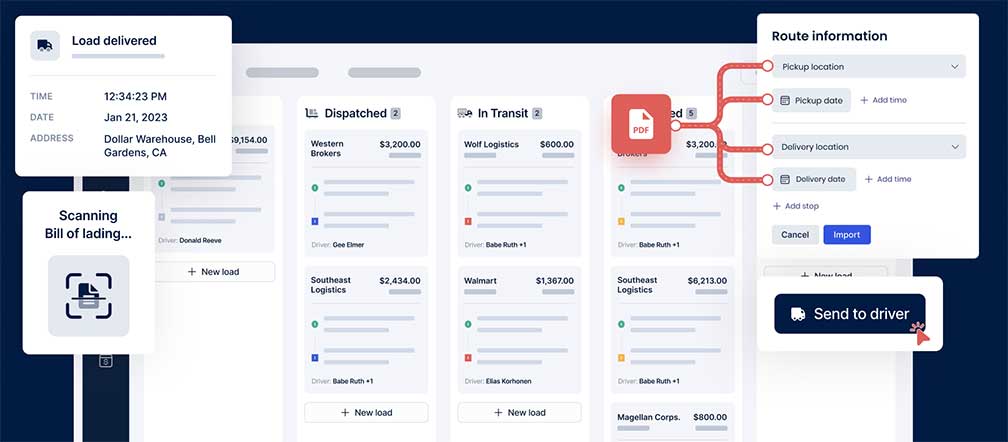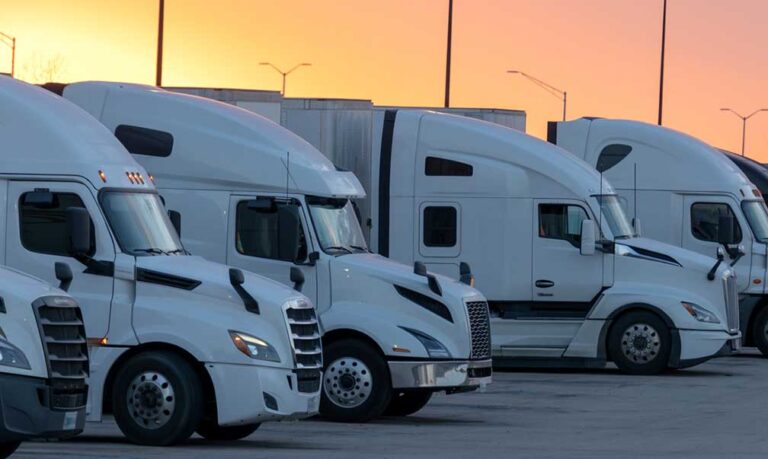SPONSORED BY TRUCKBASE
Compressed freight rates, coupled with a surge of owner-operators entering the market during and after the COVID-19 pandemic, carriers face an increasingly tight market. Every edge matters when it comes to winning the highest-paying loads — and then maintaining those customer relationships.
As a carrier, the TMS you choose can make or break your business. It can be a force multiplier for growth, or it can create massive disruption and set you back.
We have discussed with countless carriers who made fateful decisions that locked them into suites that didn’t fit their needs and created more pain than gain. Inversely, there are countless success stories where the carrier TMS selected made for a stair-step function in the carrier’s operational efficiency, ability to “wow” customers and support growth without requiring commensurate headcount additions.
This article is geared toward growing fleet owners who face the critical decision of which software is best for their business, based on their unique business profile, needs, and priorities.
Here are several options to consider.
Truckbase: #1 Recommended Carrier TMS for 10- to 100-Truck Fleets
Truckbase emerged in 2021 as a modern provider looking to offer carriers a more focused alternative to bloated legacy TMS offerings.
By solely focusing on small and medium fleets that tend to have dedicated lanes — which often require EDI connections for seamless data flow — Truckbase has been able to deliver an easy-to-use yet robust system that is reasonably priced and well suited for the growing, modern carrier.
Most other TMSs serve shippers and brokers as well. By lasering in on one core user group, asset-based carriers, Truckbase’s software suite is far more streamlined and tailored for that audience.
As Coleman Broman, vice president at PackageRunner, put it, “Truckbase was the best out of the four options we were considering. They also struck the right mix of feature volume, feature quality, and price for our company. I would pick Truckbase 10/10 times over a system like McLeod.”
Package Runner is an OTR fleet based out of Salt Lake City and operates roughly 100 trucks.
Truckbase TMS Reviews
On the subject of reviews, Truckbase has earned the highest overall rating (4.9 out of 5) among trucking dispatch software and carrier TMS providers on Capterra, the leading software reviews site in the US.
Last year, Truckbase also won Capterra’s coveted awards for Best Ease of Use, Most Recommended, Best Value, and Best Customer Support.
 Truckbase’s TMS serves carriers as its daily system or record and is the software hub through which everything else flows. This includes CEO-level dashboards and reporting, driver settlements and ELD integrations for live fleet tracking — all integrated seamlessly into its core truck dispatch suite.
Truckbase’s TMS serves carriers as its daily system or record and is the software hub through which everything else flows. This includes CEO-level dashboards and reporting, driver settlements and ELD integrations for live fleet tracking — all integrated seamlessly into its core truck dispatch suite.
Carriers that tend to reap the most rewards from Truckbase are those that also require EDI connections into their largest customers, which many larger more sophisticated brokers and shippers are increasingly requiring. This provides for seamless data flows, automating billing and invoicing, and the elimination of check calls, so it tends to be advantageous to the carrier in addition to their customers.
Truckbase’s focus on simplifying dispatch, combined with an easy-to-use interface and seamless integrations, makes it the top choice for carriers looking to boost efficiency and grow in 2024 and beyond.
Carrier TMS Providers: Four Alternatives to Consider
1. McLeod: A feature-rich solution for the largest fleets
McLeod offers one of the oldest and largest carrier TMSs in trucking and is particularly favored by large-scale fleets. It’s best if you have several hundred to thousands of trucks — along with a dedicated IT team that can implement, train and teach the system to your organization. Even though it’s a comprehensive offering, it comes with a hefty price tag, has an overwhelming number of modules to choose from and learn, and the usability may leave your team wanting a more modern and clean solution.
2. ITS Dispatch: A cost-effective option for the smallest fleets
ITS Dispatch, now a part of the Truckstop family of companies, is designed for fleets with one to five trucks. It tends to have sufficient functionality to grow up to 10 or so trucks, but it starts to break down when you need multiple dispatchers in the system and require more advanced capabilities such as EDI. Like McLeod, ITS is built on a more dated technology stack, which means updates come less frequently and the user experience is dated and cumbersome.
3. Axon Software: For integrated accounting needs
For carriers not using QuickBooks and in need of built-in accounting, Axon Software stands out. If your finance team is ready to adapt to a new system, Axon offers a comprehensive solution.
However, QuickBooks remains a popular choice among accounting professionals due to its affordability, robust features and compatibility with leading TMS solutions. As your fleet grows, consider whether the transition to a new accounting system is worthwhile, especially if Axon’s core TMS features (dispatch, driver pay, EDI integrations, truck tracking) don’t measure up to competitors.
4. Google Sheets: A ubiquitous free tool to help you get started
Google Sheets — or even Excel — is where fleets tend to start out. When your operation is just you and one or two other people, and you want to keep costs at a minimum, this can be a fine place to start. Google Sheets begins to break down when check calls from customers and driver messaging become overwhelming. You begin to require a carrier TMS with built-in dispatching capabilities, driver settlements, live vehicle tracking and a direct tie-in to your accounting system. While we have seen fleets grow to 50 or more trucks on Google Sheet or Excel, that often comes with considerable pain and makes switching to a genuine carrier TMS a more onerous process than doing so early in a carrier’s journey.
Conclusion: The right Carrier TMS for you
The right carrier TMS comes down to your unique business profile and what you’re solving for. If you are not on QuickBooks and want built-in accounting, Axon may be the ideal solution, even if it’s lacking some of the core dispatching user-friendliness. If you are among the largest fleets, McLeod might be a better choice.
If you have 10-100 trucks and want a user-friendly solution that can accommodate your team’s unique requirements from dispatch to KPI dashboards to driver settlements, Truckbase’s TMS is the answer in 2024.
Carrier TMS FAQs
Question: How do I determine the best carrier TMS for my business?
Answer: To find the best carrier TMS, consider your unique business needs, fleet size and budget. Evaluate different options based on their features, ease of use, integration capabilities and customer support. Truckbase is a top choice for fleets with 10-100 trucks seeking a user-friendly and efficient solution.
Question: Can Truckbase integrate with my existing systems?
Answer: Yes, Truckbase offers seamless integrations with various systems, including ELDs for live fleet tracking and EDI connections for automated billing and invoicing, ensuring smooth data flow and improved operational efficiency.
Question: How does Truckbase compare to other carrier TMS providers?
Answer: Truckbase is designed for small- to medium-sized fleets (10-100 trucks) and focuses on asset-based carriers. It offers a streamlined, user-friendly interface and robust features at a reasonable price. Truckbase is known for its excellent customer support and high user satisfaction ratings.
Question: What are the main features of Truckbase?
Answer: Truckbase offers a range of features, including:
- Simplified Dispatching: User-friendly dispatching tools to improve operational efficiency.
- CEO-Level Dashboards and Reporting: Comprehensive reporting tools for better decision-making.
- Driver Settlements: Efficient management of driver payments.
- ELD Integrations: Live fleet tracking through ELD integrations.
- EDI Connections: Seamless data flow with automated billing and invoicing.
Question: Who is the ideal customer for Truckbase?
Answer: Truckbase is ideal for small to medium-sized fleets (10-100 trucks) that need a focused, easy-to-use TMS with robust features and seamless integrations. It’s particularly beneficial for carriers that require EDI connections and aim to enhance their operational efficiency and customer service.

Linda Garner-Bunch has been with The Trucker since 2020, picking up the reins as managing editor in 2022. Linda has nearly 40 years of experience in the publishing industry, covering topics from the trucking and automotive industry to employment, real estate, home decor, crafts, cooking, weddings, high school sports — you name it, she’s written about it. She is also an experienced photographer, designer and copy editor who has a heartfelt love for the trucking industry, from the driver’s seat to the C-suite.








